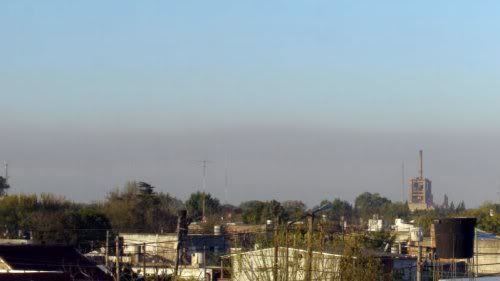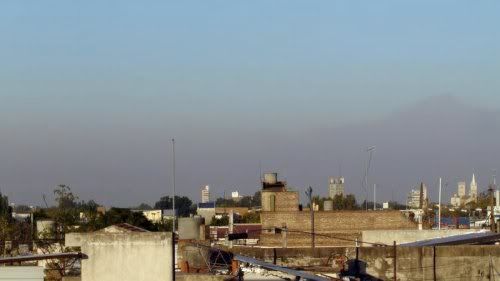
"Smoke paralyzes the country", warns Perfil, "Retiro station is closed and trucks cannot leave Buenos Aires". "Smoke also affects Entre Ríos and Santa Fe", almost parenthetically notes Crítica. "Behind a shroud of fog", ironizes Página/12, echoing the lyrics of the March of the Malvinas, while the accompanying picture shows a grayed-out Puerto Madero. "The smoke in the city will not go away", says La Nación, essentially titling a glorified weather forecast.
All I can say is... wow. To the otherwise uninformed reader, it would seem like this is a unique phenomenon, rather than something we backward hinterlanders have been suffering for years. Cattle farmers of the Paraná river delta in the provinces of Entre Ríos and Buenos Aires have been using fire to clear fields on the islands all along the littoral for ages; the smoke is blown westward towards us (Rosario and the cities south of it), and the government of Entre Ríos has never answered to Santa Fe's requests that they police their territory, or to more desperate requests made before national authorities and environmental agencies. But one day porteños wake up smelling the smoke and the whole country is suddenly in grave danger, paralyzed and terrified.
"It seems the smoke has to reach Capital Federal for someone to try and solve this problem", as Rosario's mayor Miguel Lifschitz tiredly put it. There's a whole chain of islands opposite Rosario, at some points no more than 600 meters from the coast, often employed for recreation, but they don't belong to our municipality; they fall under the jurisdiction of Victoria, located on dry land on the other side of the delta, almost 60 km away, which has never cared for them (except to collect taxes). For years Rosario has demanded that they control the fires and punish the farmers who use them to clear the islands, damaging the ecosystem (an important wetland) and smoking our city. They've mocked us with their silence.

But the governor of Entre Ríos knows better than to bother Buenos Aires. I mean, the president lives there, and she would get absolutely mad if her European furs caught that smoke! So right after Environment Secretary Romina Picolotti called the governors of the three affected provinces, the governor of Entre Ríos Sergio Urribarri promised to work on it, and Victoria's mayor also noted he has a list of the islands' landowners who've been setting their fields on fire, so they can be sued.
Later, though, we learned that this was already done in 2004 — a judge in Entre Ríos took the case and the process ran smoothly, until the accusation was appealed and dismissed. The reason: clearing fields by fire is an "ancestral practice" so it can't be abolished just like that. Even though some of the perpetrators clearly knew that the fire could spread out of control.
In the meantime, traffic accidents have been allowed to happen, half a dozen people have died in the road just last week, and now the Rosario-Victoria bridge is closed to traffic, as are several major routes. The core of Argentina's industrial, agricultural and overseas trade area is half-paralyzed, its ports closed, its roads blocked, for completely avoidable causes due to intentional fires initiated by people who've been identified for a long time — but the real news is that porteños cannot leave their precious city. I repeat, in case you didn't get it before — this is old news to everyone in Rosario and around, but only became a national concern because Buenos Aires was affected.
There's a saying here, "God is everywhere, but His office is in Buenos Aires." It could very well date back to the federalist struggle of early and mid-19th century. That's how long we've been fighting this fight.













No comments:
Post a Comment
Note: Only a member of this blog may post a comment.